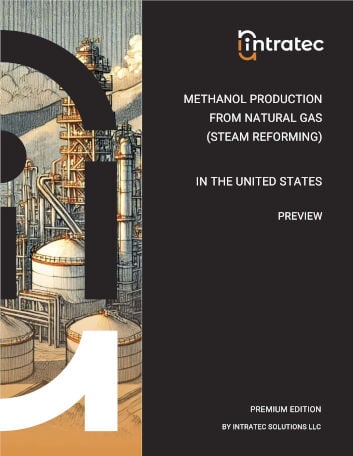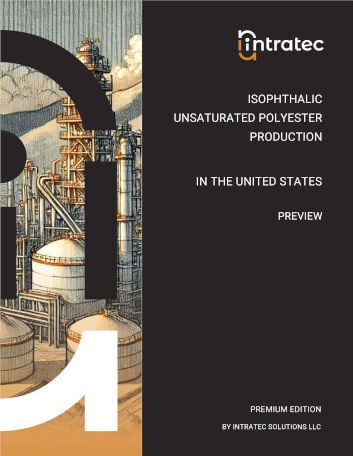Commodity Production Costs Report
Styrene Production from Methanol & Toluene
Styrene Plant Capital & Operating Cost Analysis | United States | Q4 2025
This report presents the economics of Styrene production from methanol and toluene. The process examined is similar to Exelus Styrene Monomer Technology (ExSyM). In this process, toluene undergoes an alkylation reaction with methanol to produce Styrene. Ethylbenzene is also generated as by-product.
The report provides a comprehensive study of Styrene production and related Styrene production cost, covering three key aspects: a complete description of the Styrene production process examined; an in-depth analysis of the related Styrene plant capital cost (Capex); and an evaluation of the respective Styrene plant operating costs (Opex).
The Styrene production process description includes a block flow diagram (BFD), an overview of the industrial site installations, detailing both the process unit and the necessary infrastructure, process consumption figures and comprehensive process flow diagrams (PFD). The Styrene plant capital cost analysis breaks down the Capex by plant cost (i.e., ISBL, OSBL and Contingency); owner's cost; working capital; and costs incurred during industrial plant commissioning and start-up. The Styrene plant operating costs analysis covers operating expenses, including variable costs like raw materials and utilities, and fixed costs such as maintenance, labor, and depreciation.

The process under analysis comprises the following major sections: (1) alkylation; (2) styrene separation and (3) purification.
* Alkylation. Initially, fresh and recycled toluene and methanol are vaporized, superheated, and fed to alkylation reactors. The reaction is carried out in a fixed-bed reactor at around 400 - 425 °C at atmospheric pressure in the presence of a modified zeolite catalyst. The effluent from the alkylation, containing Styrene, ethylbenzene, hydrogen, carbon monoxide and unconverted methanol and toluene, is then directed to separation steps downstream.
* Styrene separation. The effluent from the alkylation step is cooled, partially condensed, and fed to a settling drum. Vapors are disengaged from the liquid phase, compressed, cooled and passed through an absorber/stripper system, for the recovery of residual aromatics which are recycled. The aqueous phase from the settling drum is fed to a distillation column, in which unconverted methanol and dissolved trace hydrocarbons are recovered. Water withdrawn from column bottom is discharged. The organic phase from the settling drum is directed to purification steps downstream.
* Purification. The organic phase from Styrene separation is mixed with dinitrophenols, which act as inhibitor to lessen polymer formation throughout distillation steps downstream, carried out under vacuum. In a first distillation step, unreacted toluene is separated from the Styrene stream and recycled to the alkylation reaction. In a subsequent distillation step, Styrene is separated from ethylbenzene, which is sold as by-product. Finally, Styrene is purified from residual impurities – mainly C9 aromatic compounds – in a last distillation step.
Report in PDF Format
Download & Explore Anytime
Access in Various Devices
Print & Read Comfortably
Share With Co-workers
Up-to-date Report
Professional report based on Q4 2025 economic data, ensuring timely evaluations.
Multiple Use Cases
Ideal for investment screening, feasibility studies, cost estimates, and research planning.
Proven Methodology
Developed using a consistent methodology honed over a decade, ensuring reliable cost analyses.
Report Editions
Content Highlights
Plant Capital Cost Summary
Summary outlining the capital cost required for building the Styrene production plant examined.
Plant Capital Cost Details
Detailing of fixed capital (ISBL, OSBL & Owner’s Cost), working capital and additional capital requirements.
Plant Cost Breakdowns
Breakdown of Styrene process unit (ISBL) costs and infrastructure (OSBL) costs; plant cost breakdown per discipline.
Operating Costs Summary
Summary presenting the operating variable costs and the total operating cost of the Styrene production plant studied.
Operating Cost Details
Detailing of utilities costs, operating fixed costs and depreciation.
Plant Capacity Assessment
Comparative analysis of capital investment and operating costs for different Styrene plant capacities.
Production Process Information
Block Flow Diagram, descriptions of process unit (ISBL) and site infrastructure (OSBL).
Process Consumptions
Raw materials and utilities consumption figures, by-products credits, labor requirements
Process Diagrams
Process flow diagrams (PFD), equipment list and industrial site configuration
Other Styrene Production Cost Reports

Styrene Production from Propylene & Ethylbenzene
This study presents the economics of Styrene production from chemical grade (CG) propylene and ethylbenzene in the United States. The process examined is a Propylene Oxide/Styrene Monomer (POSM) technology similar to the one owned by LyondellBasell. This process involves ethylbenzene oxidation, epoxidation, hydrogenation and dehydration steps.
Details: 850 kta United States-based plant | Q4 2025 | 107 pages | Issue B | From $1,199 USD

Styrene Production from Ethane & Benzene (H2 as Co-Product)
This report presents the economics of Styrene production from ethane and benzene in the United States, with pure hydrogen as by-product. In this report, ethylbenzene (EB) is first generated from benzene and recycled ethylene. Then, fresh ethane and the EB are dehydrogenated to form ethylene and Styrene. The process analyzed is based on concepts proposed in patents issued to Dow and Snamprogetti.
Details: 750 kta United States-based plant | Q4 2025 | 107 pages | Issue C | From $1,199 USD

Styrene Production from Ethane & Benzene (H2 as Fuel)
This study presents the costs associated with Styrene production in the United States. In this report, ethylbenzene (EB) is first generated from benzene and recycled ethylene. Then, fresh ethane and the EB are dehydrogenated to form ethylene and Styrene. The hydrogen produced is valued as fuel. The process analyzed is based on concepts proposed in patents issued to Dow and Snamprogetti.
Details: 750 kta United States-based plant | Q4 2025 | 107 pages | Issue D | From $1,199 USD
Bundle & Save
Purchase multiple Styrene Production Cost reports and enjoy tiered discounts
up to 30% off!
Could Not Find the Report You Need?
Obtain a Bespoke Report
Get a report targeting the process in which you are interested
See Offer Details
Understand Bespoke Reports and how you can easily order them
Check Editions & Pricing
Complete a brief form and see a quotation for your Bespoke Report
Other Related Production Cost Reports

Methanol Production from Natural Gas (Combined Reforming)
This study presents the economics of large-scale Methanol production from natural gas in the United States. In this process, natural gas is first converted into synthesis gas (syngas) by means of conventional steam reforming and secondary autothermal reforming. Then, the syngas is converted into Methanol.
Details: 1700 kta United States-based plant | Q4 2025 | 107 pages | Issue B | From $799 USD

Toluene Production from Pygas
This study presents the economics of Toluene production from pyrolysis gasoline (pygas) in the United States using a typical liquid-liquid extraction process.
Details: 400 kta United States-based plant | Q4 2025 | 107 pages | Issue B | From $799 USD

Expandable Polystyrene Production
This study presents the economics of Expandable Polystyrene (EPS) production from styrene in the United States, via a typical batch suspension polymerization process. The tiny spheres of EPS are impregnated with a physical blowing agent.
Details: 150 kta United States-based plant | Q4 2025 | 107 pages | Issue C | From $799 USD

Methanol Production from Natural Gas (Steam Reforming)
This study presents the economics of large-scale Methanol production from natural gas in the United States. In the process examined, natural gas is first converted into synthesis gas (syngas) by means of conventional steam reforming and then the syngas is converted into Methanol.
Details: 1000 kta United States-based plant | Q4 2025 | 107 pages | Issue A | From $799 USD

Isophthalic Unsaturated Polyester Production
This report presents the economics of Isophthalic Unsaturated Polyester production from maleic anhydride, isophthalic acid, propylene glycol and styrene using a two-stage batch process located in the United States. In the first stage, the glycol and isophthalic acid react to produce a cleat melt. Maleic anhydride is added subsequently and the resin is completed.
Details: 70 kta United States-based plant | Q4 2025 | 107 pages | Issue A | From $799 USD

Toluene Production from Reformate
This report presents the economics of Toluene production from reformate. The reformate is submitted to a typical sulfolane liquid-liquid extraction, giving a mixture of aromatics, which is further processed to yield pure Toluene. Benzene and mixed xylenes are produced as by-products. The economic analysis presented is based on a plant constructed in the United States.
Details: 350 kta United States-based plant | Q4 2025 | 107 pages | Issue A | From $799 USD
+800 Reports Developed, Targeting +250 Commodities
Vast Report Library
858 independent and up-to-date reports examining embryonic and established production processes.
Free Sample Reports
Quickly understand the structure and depth of content of our professional reports.

